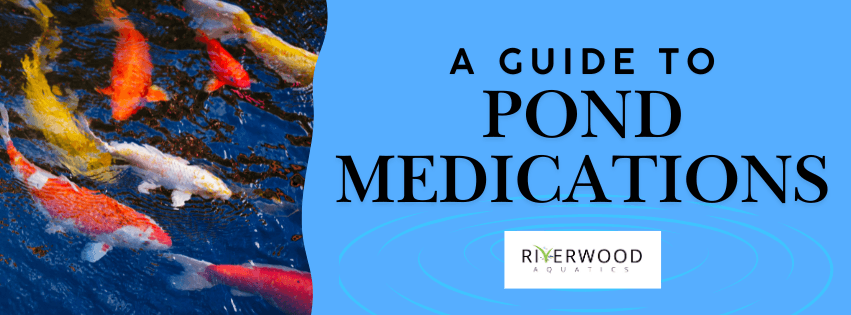A Guide To Pond Medications
A Guide to Pond Medications
Pond Medications are a safe and effective way to treat sick pond fish and pond fish diseases
Maintaining a healthy pond environment is crucial for the well-being of your fish and preventing pond fish diseases but sometimes pond medications are required. While preventative measures like water changes, good filtration, and a balanced diet are essential, there are times when pond medications become necessary to combat diseases and parasites. In this guide, we’ll cover why some medications fail in cold water, safe ways to treat sick pond fish during winter, understanding water temperature thresholds, and natural remedies to manage pond fish diseases throughout the year.
Why Pond Medications Are Needed
Just like any living creature, pond fish are susceptible to various ailments, including:
- Parasites: External parasites like ich (white spot), anchor worms, and fish lice can irritate the skin and gills, causing discomfort and potentially leading to secondary infections. Internal parasites, such as flukes, can affect various organs and impair fish health.
- Bacterial Infections: Bacterial infections can manifest in various ways, including fin rot, ulcers, and systemic diseases.
- Fungal Infections: Fungal infections often appear as cottony growths on the fish’s body or fins. They can be secondary to injuries or stress.
When these issues arise, pond medications can be vital in treating the underlying causes and restoring your fish to health.
When to Use Pond Medications
It’s important to accurately diagnose the problem before administering any medication. Observe your fish for any signs of illness, such as:
- Abnormal swimming behaviour: Lethargy, erratic swimming, or gasping at the surface.
- Physical abnormalities: White spots, ulcers, fin damage, or unusual growths.
- Changes in appetite: Loss of appetite or refusal to eat.
- Isolation: Fish separating themselves from the others.
If you notice any of these signs, it’s crucial to identify the specific issue. Consult with a local aquatic veterinarian or experienced pond keeper for assistance in diagnosis.
When Not to Use Pond Medications
- As a Preventative Measure: Avoid using medications prophylactically. Overuse can lead to resistant strains of pathogens and disrupt the delicate balance of the pond ecosystem.
- Without a Proper Diagnosis: Never medicate without a clear understanding of the problem. Incorrect treatment can worsen the situation or harm your fish.
- In a Newly Established Pond: A new pond is still establishing its biological filter. Medications can potentially disrupt this process and hinder the development of beneficial bacteria.
- During Extreme Weather Conditions: Avoid medicating during periods of extreme heat or cold, as these conditions can stress the fish and make them more susceptible to adverse reactions. A fishes metabolism are slows down considerably in the cold which severely impacts on many medications uptake.
Why Some Pond Medications Fail in Cold Water
Many pond medications are designed to work within specific temperature ranges. As temperatures drop, the metabolism of fish slows down, which affects how their bodies absorb and respond to treatments. Similarly, the effectiveness of certain medications decreases as water temperatures fall below a certain point.
Here are a few reasons why medications may fail in cold water:
- Slower Absorption: Fish have a slower metabolic rate in colder temperatures, which means they absorb medications more slowly. This can reduce the effectiveness of treatments and prolong recovery times.
- Bacterial Activity: Some medications rely on bacteria to break down harmful substances in the water. In colder conditions, beneficial bacteria become less active, which can reduce the effectiveness of treatments.
- Chemical Reactions: The chemical composition of some medications changes in colder water, making them less effective or even harmful to fish.
Safe Ways to Use Pond Medications in Winter and how to treat sick pond fish
Treating sick pond fish in winter requires careful consideration of water temperature and the type of medication being used. Here are some tips for safely medicating your fish in colder months:
1. Monitor Water Temperature
Before administering any medication, check the water temperature. Most pond medications are formulated to work best in water temperatures above 10°C (50°F). If your pond’s temperature is below this threshold, you may need to consider alternative treatments such as salts if medication is urgently required.
2. Use Cold-Water-Specific Medications
Some manufacturers produce medications specifically designed for use in cold water. These treatments are formulated to remain effective at lower temperatures, making them a safer choice for winter use.
3. Isolate Sick Fish
If possible, move sick fish to a quarantine tank with a controlled temperature. This allows you to treat them in warmer water without affecting the entire pond ecosystem. A small heated quarantine tank can make a significant difference in recovery times.
4. Reduce Stress
Fish are more vulnerable to stress in winter, which can weaken their immune systems. Ensure your pond environment is as stress-free as possible by maintaining stable water parameters and reducing disturbances.
5. Avoid Overfeeding
In winter, fish metabolism slows, and they require less food. Learning how to treat sick pond fish by not overfeeding can help with poor water quality, which can exacerbate health issues and pond fish diseases if left unchecked.
Final Thoughts on Pond Medications and pond fish diseases
By understanding how to use pond medications effectively and recognising the importance of targeted treatments, you can better manage pond fish diseases. Prevention is always better than cure, so prioritise maintaining a clean and balanced pond environment to minimise the need for medications.
For more advice on keeping your pond fish healthy, consult with a specialist or visit Riverwood Aquatics where we would be pleased to help you and get your fish back to optimal health. Browse our range of pond treatments here and please do consider subscribing to our YouTube channel for and our Instagram page more tips and inspiration.



